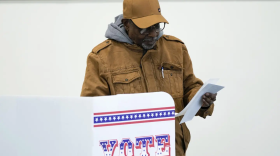-
We marked the 100-year anniversary of Dr. Ossian Sweet’s act of self defense that led to his acquittal in an historic murder case that highlighted the anti-Black violence of redlining in 1920s Detroit. And we visited Kalamazoo’s first-ever city mural festival.
-
An amendment and a related package of legislation include limits on how long people can be held by law enforcement without being charged with a crime.
-
Lift Every Voice and Vote is an initiative to encourage every eligible Black voter in Detroit to register to vote — and follow through by voting in every election.
-
The Legislature debates a bill package around transgender youth in sports. Then, one person’s journey to become the first person to kayak around the Great Lakes. Plus, the impact of the EPA delaying setting guidelines for PFAS.
-
Michigan parents of students with disabilities feel ‘hopeless’ as civil rights cases remain in limboHundreds of federal civil rights cases were put on hold after President Donald Trump took office in January. Parents of students with disabilities and those who experience racial discrimination or sexual violence in schools are uncertain of the fate of their federal complaints. Many say they have not gotten updates on their cases since the regional offices closed.
-
On today's show, a lawsuit against the University of Michigan is challenging its campus ban for students and community members who participated in protests over the war in Gaza last year. Also, a buzzy new Detroit restaurant serves up Mexico City-inspired fare for the Motor City. And, the iconic Detroit musician J Dilla has a street named in his honor.
-
Jay Kaplan, an attorney for the American Civil Liberties Union of Michigan, discusses the impacts of the executive order by President Donald Trump on gender-affirming care.
-
Today, how bird flu is decimating flocks and egg production. Then, education developments to keep an eye out for this year. Later, how Black Detroiters were the forerunners of the modern lottery system.
-
It is legal to speak your mind, advocate for yourself or record police activity in most circumstances. Still, attorneys and a former law enforcement officer say there’s no guarantee your rights will be respected in the moment — or that it’s always safe to exercise them.
-
The department's Office of Civil Rights investigated 75 instances of alleged discrimination and harassment based on shared Jewish ancestry and shared Palestinian or Muslim ancestry. The investigation found that the university's responses did not meet its Title VI requirements to remedy the hostile environment.
Play Live Radio
Next Up:
0:00
0:00
Available On Air Stations









